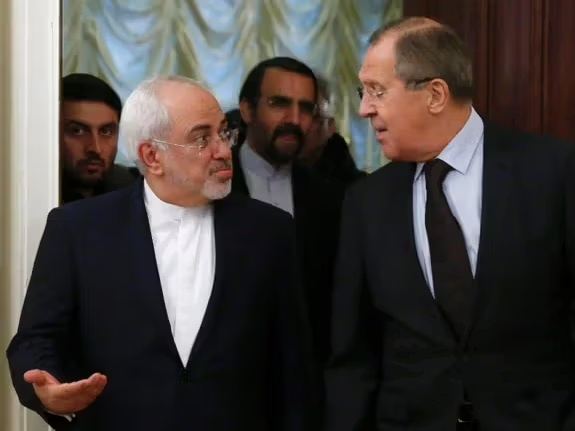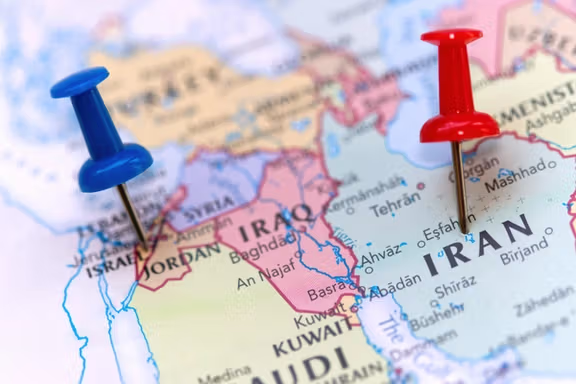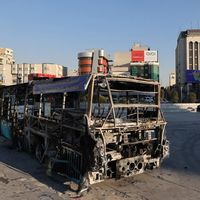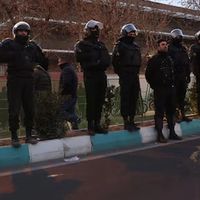Citrinowicz, a former head of the Iran branch within Israel's military intelligence, said the United States still seeks a negotiated deal with Tehran while Israel remains focused on weakening or toppling the Islamic Republic — a fundamental imbalance he warned makes escalation “almost inevitable.”
“The starting point of the next war will be the ending point of the previous one,” he said.
Now a nonresident fellow with the Atlantic Council’s Middle East program, Citrinowicz also serves as a research fellow at the Institute for National Security Studies (INSS) in Tel Aviv.
“It will be very violent from the get-go. And I really think that there won’t be a mechanism that will allow us to close it, because unlike previously when the US forced the sides to close it, now the Iranians will not be willing to close it until they feel they have balanced the equation of deterrence with Israel."
"That is why I think the next will be much more violent and longer,” he added. "It will lead to more civilian casualties."
Citrinowicz’s warning comes as President Donald Trump continues to frame the 12-day Iran–Israel war as a decisive victory. Trump has repeatedly maintained US B-2 bomber strikes "obliterated" Iran’s key nuclear sites, forcing Tehran to accept a ceasefire and halting its nuclear ambitions.
Critics, however, say the claim is largely rhetorical and that the strikes likely delayed, not ended, Iran’s nuclear advancements, leaving the conflict’s root cause unresolved.
Satellite imagery taken in recent months shows that Iran is continuing construction at the Natanz “Pickaxe” mountain or Mount Kolang Gaz-La, consistent with activity seen before the June war.
The mountain complex south of Natanz includes another older tunnel network associated with Iran’s main enrichment site, which also shows signs of ongoing work, particularly reinforcement of tunnel entrances.
'Israel didn't win anything'
After the 12-day war between Israel and Iran, many in Israel came away with the impression that Israel had won the war. Iran was hit hard, and Israeli operations left Tehran no longer viewed as a threshold nuclear state, as US and Israeli officials say. But Citrinowicz argues that this is a dangerous misconception.
“In Israel we have the wrong perception. We are saying we won — we didn’t win anything,” he said. “We had major achievements, but from the Iranian standpoint, they really believe they had major achievements too. Both sides think they won, and that’s what makes another clash inevitable.”
Citrinowicz says Israel must not underestimate Iran’s capacity to recover. He noted that Tehran has rapidly replaced assassinated commanders, resumed missile testing “almost daily,” and is seeking Russian and Chinese air defense systems to harden its skies.
“If there’s one lesson from recent history,” he said, “it’s that the regime is stronger than many believed.”
Another confrontation, he said, is likely within weeks or months as Washington’s demands — on uranium enrichment, missile limits and even some talk of joining normalization deals with Israel — meet flat Iranian refusals.
He argued that US advisers continue to misread Iran’s ideology and decision-making, while Tehran is rapidly rebuilding and testing capabilities at Natanz and Fordow, and acting bolder at sea — all of which may prod Israel into striking again.
Israel, he added, is unlikely to enjoy the same US military umbrella it had during the last war, when Washington deployed advanced interceptors and coordinated air operations. With Trump now juggling multiple crises, Citrinowicz said, “Israel could face a far tougher fight — and far less help.”
Just over a year ago, Iran launched Operation True Promise II against Israel — part of a steady escalation in which each confrontation has become more intense.
'Growing gap' between US and Israel on Iran
In his October 13 address to the Knesset, Trump declared that Iran had been “two months away” from a bomb before the US strikes in June and that he “terminated” its nuclear program afterward. “They’re not starting anything,” he said. “They just want to survive.”
Those lines, Citrinowicz cautioned, project misplaced confidence.
“Despite the fact that both sides basically want to reach an agreement, their present stances are not allowing one to be reached,” he said.
“What President Trump said in Israel actually highlights that misunderstanding — about Iran’s behavior and ideology — that will probably lead to another confrontation. Definitely, we are reaching another round of escalation.”
He added that the same misunderstanding defines the widening gap between Washington and Tel Aviv. While Trump hopes pressure will push Iran back to the table, Israel’s objective remains regime change.
“If Israel’s goal is to prevent a nuclear Iran,” he said, “an agreement, not another war, serves that purpose best.”
You can watch the full episode of Eye for Iran on YouTube or any podcast platform of your choosing like Spotify, Apple, Amazon, or Castbox.














